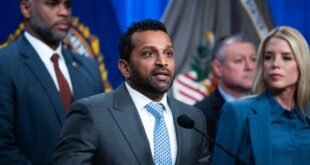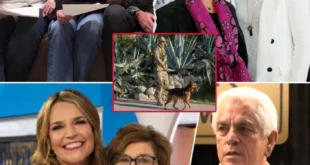For a man who has built an empire on confidence, Donald Trump rarely lets a slip of the tongue slow him down.
But this time, the world didn’t just notice — it laughed.
At a European summit this week, world leaders were caught on camera chuckling over one of the President’s most baffling mix-ups yet — confusing Azerbaijan with Albania.
It wasn’t the first time he’s blurred the borders between two nations separated by almost 2,000 miles.
But this time, the moment became global comedy.
The “Peace Deal” Between Two Countries That Don’t Share a Border
The story began when Trump, speaking in an interview last month with Fox News, bragged about “solving wars that were unsolvable.”
Among those apparent triumphs, he proudly listed a peace deal between — you guessed it — “Azerbaijan and Albania.”
“I solved wars that were unsolvable,” Trump declared.
“Azerbaijan and Albania, it was going on for many, many years. I had the prime ministers and presidents in my office.”
It was a classic Trump boast — sweeping, self-assured, and, as it turned out, geographically impossible.
Azerbaijan borders Armenia, not Albania.
Albania, meanwhile, sits in southern Europe, on the Adriatic Sea — 1,700 miles away.
The only war those two nations have ever fought is over how often people confuse their names.
The World Reacts
At first, it was just another Trumpism — the kind that draws an eye-roll in Washington and a shrug from his supporters.
But when the European Union summit began in Copenhagen on Thursday, the leaders of France, Azerbaijan, and Albania couldn’t resist a laugh.
In a lighthearted exchange caught on camera, Albanian Prime Minister Edi Rama turned to French President Emmanuel Macron and Azerbaijani President Ilham Aliyev.
“You should make an apology to us,” Rama teased Macron, “because you didn’t congratulate us on the peace deal that President Trump made between Albania and Azerbaijan.”
Macron smirked. Aliyev cracked up.
The three men laughed together — a moment of unity forged not by diplomacy, but by Trump’s mistake.
“I’m sorry for that,” Macron replied, smiling.
Within minutes, the clip spread across social media. European journalists dubbed it the “Aber-baijan summit.”
The “Peace Deal” That Never Was
To be clear, Trump did broker a deal in August — but it wasn’t between Albania and anyone.
The actual agreement was between Azerbaijan and Armenia, two neighboring nations long locked in a bitter conflict over the Nagorno-Karabakh region, where clashes have claimed tens of thousands of lives since the late 1980s.
In August, President Ilham Aliyev of Azerbaijan and Prime Minister Nikol Pashinyan of Armenia met at the White House, where Trump presided over what he called a “historic peace.”
“We brought them together, and it was beautiful,” Trump said at the time. “They were fighting for decades, and we stopped it. Everyone said it couldn’t be done.”
But as diplomats later clarified, the peace deal is still unsigned — sitting, as one aide put it, “in a White House folder labeled ‘DONE.’”
Despite the stalled progress, Trump has repeatedly touted it as one of his greatest diplomatic victories.
“Aber-baijan” — and the Hug Heard Around the World
During a joint press conference with British Prime Minister Keir Starmer this week, Trump tried again to celebrate his role in the agreement — but ended up adding fuel to the fire.
“I am very disappointed in the fact that that one’s not settled,” Trump said.
“To think that we settled Aber-baijan and Albania, as an example. It was going on for years. It was never gonna be settled.”
He paused, seemingly unaware that his words had once again collided head-on with geography.
“If you remember the prime minister and the presidents and they were there for many years,” Trump added. “They said when they were in my office, we settled. And they started off at both sides of the Oval Office — so far away, I didn’t know you could be so far away.
And as we were together for an hour, they kept getting closer and closer and by the time we finished, we all hugged each other.”
Reporters later noted that no such meeting between the leaders of Albania and Azerbaijan has ever taken place.
Nevertheless, Trump described it with cinematic detail — right down to the hug.
The Internet Reacts
Within hours, Trump’s “Aber-baijan” quote went viral.
One European columnist joked that “the President appears to have united Europe — in laughter.”
Memes flooded X (formerly Twitter).
Some showed maps of Europe with arrows pointing in every direction.
Others photoshopped Trump between Albanian dancers and Azeri soldiers, with the caption: “The peacemaker.”
Political satirist Rory Bremner posted:
“Breaking: Albania and Azerbaijan formally declare eternal friendship after Trump settles their long-standing feud over vowels.”
Even CNN’s European desk couldn’t resist a dig, calling it “one of the rare times a Trump policy has managed to make both France and Azerbaijan smile.”
A Long History of “Trump Geography”
This isn’t the first time Trump’s sense of direction has caused headlines.
Throughout his political career, the former real estate mogul has had a famously flexible relationship with geography — from calling Belgium a ‘beautiful city’ to once suggesting Finland was part of Russia.
In 2018, during a NATO meeting, he reportedly asked aides whether the Baltics were in the Balkans, leaving diplomats from both regions unsure how to respond.
He also claimed to have met the “President of the Virgin Islands” — apparently forgetting that he himself held that title as U.S. President.
Yet, none of those moments caught on quite like this one.
Because this time, European leaders didn’t just laugh behind closed doors — they laughed together, on camera.
The Power of a Global Joke
The humor was gentle, but the symbolism was powerful.
In a world fractured by political tension, trade wars, and regional conflicts, a shared moment of laughter between Macron, Rama, and Aliyev felt almost surreal.
“In a strange way, Trump accidentally did bring peace,” joked one French journalist. “He united Europe — in ridicule.”
But for Trump’s critics, the episode highlighted something deeper — a recurring pattern of self-aggrandizement, exaggeration, and factual slippage that has defined his rhetoric for years.
“He doesn’t lie maliciously,” one former European diplomat said. “He just says what makes him sound good in that moment — even if it makes no sense geographically.”
The Albanian Response
In Tirana, the Albanian capital, the story dominated morning talk shows.
One newspaper splashed the headline: “Trump Ends Albania–Azerbaijan War We Never Knew We Were In.”
Social media users had a field day.
Some Albanians mock-thanked Trump for “ending the war,” posting pictures of peace doves and olive branches.
Others joked that they were “open to trade talks with Baku, now that peace has been restored.”
Azeri commentators joined in on the fun.
One user wrote: “Dear Mr. President, thank you for freeing us from the Albanian conflict that never existed.”
The Diplomatic Reality
Behind the humor lies a more serious reality.
The actual Azerbaijan–Armenia peace process remains fragile, with deep tensions over territory, refugees, and post-war reconstruction.
The U.S. State Department confirmed that the August deal Trump referred to remains unsigned, though officials say progress continues “quietly and cautiously.”
Trump’s repeated public claims that he “solved” the conflict have frustrated some diplomats, who say the remarks risk oversimplifying one of the world’s most complicated disputes.
“Every time he says it’s solved, people on the ground roll their eyes,” said one European envoy familiar with the talks. “This isn’t a real estate deal. You can’t just shake hands and call it done.”
A Pattern of Bluster
Still, Trump shows no sign of backing down.
In a post on Truth Social shortly after the Copenhagen summit, he doubled down:
“The Fake News Media is saying I confused two countries — WRONG! I brought peace to both. Everyone said it couldn’t be done. I did it, and nobody gives me credit!”
He ended the post with: “You’re welcome, world.”
Supporters flooded his page with messages of praise, calling the ridicule “just more global jealousy.”
Critics countered that the mockery was earned — and that the President’s tone-deaf self-congratulations only deepened the comedy.
The Last Laugh
At the summit in Copenhagen, laughter faded back into policy discussions, but the moment lingered.
For once, the leaders of France, Albania, and Azerbaijan had found a rare point of agreement — if only about the limits of American geography.
“It was a human moment,” said one European diplomat afterward. “The world is tense right now — maybe we needed that laugh.”
Meanwhile, in Washington, aides reportedly briefed the President once again on the difference between the two nations.
Whether it sticks this time remains to be seen.
But if history is any guide, Trump’s next global geography lesson is just one speech away.


